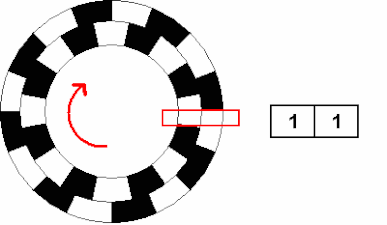ESP32Encoder
ESP32Encoder library that uses the ESP32 pulse counter hardware peripheral:
https://docs.espressif.com/projects/esp-idf/en/latest/api-reference/peripherals/pcnt.html
There is only one interrupt for the peripheral, and that is managed by the library. The user has no interrupt interface, and no interrupts are generated on each pulse. Interrupts arrive when the 16 bit counter buffer overflows, so this library has a tiny interrupt footprint while providing support for up to 8 simultaneous quadrature encoders.
This hardware peripheral supports only 8 encoders.
Support
ESP32 and ESP32c2 are supported.
ESP32c3 does not have pulse counter hardware.
ESP32s3 has just 2 PCNT modules, so only supports 2 hardware accelerated encoders
Documentation by Doxygen
Quadrature Explanation
For information on the type of encoder this library is for, see: https://en.wikipedia.org/wiki/Incremental_encoder
The modes of reading encoders in this library are full and half quadrature, and single edge count mode.

Full performs a count increment on all 4 edges, half on the rising and falling of a single channel, and single counts just the rising edge of the A channel.
Pull Downs/Ups
To specify the weak pull resistor set the value useInternalWeakPullResistors with the enum types UP, DOWN, or NONE
ISR service CPU core
To specify the CPU core for the PCNT ISR service set the value isrServiceCpuCore to the desired core number. This can be usefull to prevent concurrency problems where the total count might not be updated correctly yet while it is read.
A note on KY-040 and similar
The "switch style" encoder wheels used by breakout modules such as:
need electrical debouncing in the range of 0.1 - 2 uf per encoder line to ground. This device bounces much more than the PCNT hardware modules debouncing time limits. Be sure to setFilter() to 1023 as well after attaching in order to get the maximum hardware debouncing.